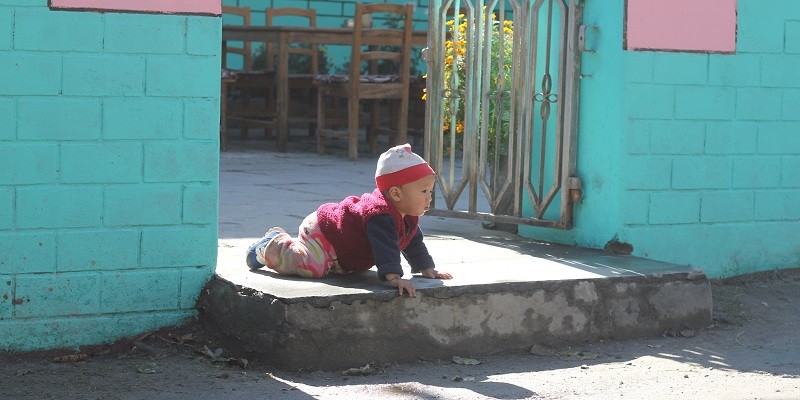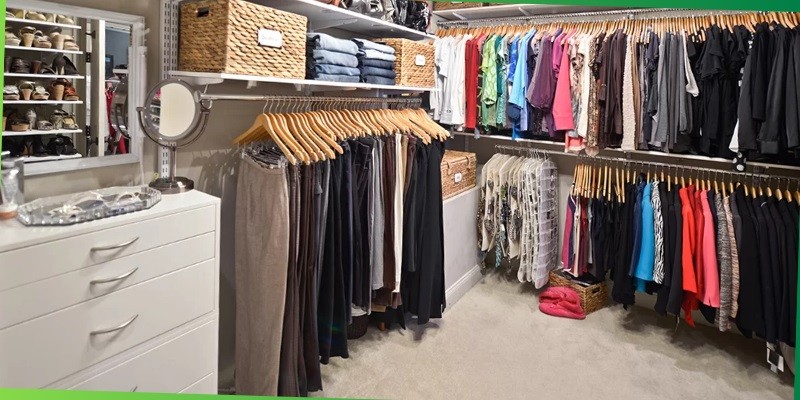Last Updated on February 5, 2023
Staircases are one of the most hazardous areas in a home, especially for small children and pets. To ensure their safety, it is necessary to block access to the stairs. The traditional solution is to use a baby gate, but what if you don’t have one or don’t want one? Here are some alternatives to block stairs without a baby gate.
How To Block Stairs Without A Baby Gate?
Use Furniture to Block Stairs
One of the easiest and quickest solutions to block stairs is to use furniture. Move a couch, armchair, or other furniture in front of the staircase. This will effectively block the stairs, and you can also use the extra seating. Ensure that your furniture is sturdy and can’t be easily moved by a child or pet.
Install a Stair Barrier
Another alternative to a baby gate is to install a stair barrier. Stair barriers are similar to baby gates but are specifically designed for use on the staircase. They can be permanently attached to the wall, making them a more permanent solution. Stair barriers are available in various styles and materials, including mesh, metal, and wood.
Use a Room Divider
If you have an open-concept home, a room divider can be used to block access to the stairs. Room dividers are tall panels that can be moved around to create separate spaces. When placed in front of the staircase, they effectively block access to the stairs. Room dividers are available in various materials, including wood, metal, and cloth, and can also add an aesthetic touch to your home decor.
Use Stair Bumpers
Stair bumpers are soft, foam-filled cushioning that can be installed on the stair edge to prevent children and pets from falling down the stairs. They can be easily installed with adhesive and are available in various colors to match your home decor. Stair bumpers are a good option if you are concerned about the appearance of your stairs and want to use something other than a bulky baby gate.
Close Off the Room at the Top or Bottom of the Stairs
Another option is to close off the room at the top or bottom of the stairs. You can install a door or gate to block access to the stairs. This is a more permanent solution, but it can also be more expensive and may only be suitable for some homes. If you choose this option, install the door or gate with a childproof lock to prevent children from accessing the stairs.
Why Baby Gates Are Essential for Your Kids: A Guide for Parents
As a parent, ensuring the safety and well-being of your child is your top priority. Baby gates are crucial for keeping your little one safe, whether you are looking to block off certain areas of your home or keep your child from climbing up or down the stairs. We will explore why baby gates are essential for your kids and what to look for when selecting the best gate for your needs.
To Keep Your Child Safe from Dangers in Your Home
One of the primary reasons to use baby gates is to protect your child from potential hazards in your home. Baby gates can be used to block off areas such as the kitchen, where there may be sharp objects, hot surfaces, or dangerous chemicals. They can also be used to keep your child away from stairs, which can be a serious hazard if not properly secured.
To Give You Peace of Mind
Baby gates also give parents peace of mind, knowing that their child is safe and secure while occupied with other tasks. With a baby gate in place, you can have the confidence to attend to your household chores, cook a meal, or take a break without having to keep an eye on your little one constantly.
To Teach Your Child Boundaries
Baby gates can also be used to teach your child about boundaries and safety. By setting up gates in certain areas of your home, you can help your child understand what areas are off-limits and what is acceptable behavior.
What to Look for When Selecting a Baby Gate?
Safety Features
When selecting a baby gate, it is important to look for one certified by the Juvenile Products Manufacturers Association (JPMA). It meets safety standards established by the Consumer Product Safety Commission (CPSC). Additional safety features include non-toxic materials, sturdy construction, and adjustable width to fit your specific needs.
Ease of Use
Choosing a baby gate that is easy to use and install is also important, especially if you will be using it frequently. Look for gates with a simple locking mechanism that can be adjusted easily to fit different doorways or openings.
Durability
Since baby gates will be subjected to frequent use, it is important to choose one that is durable and can withstand the wear and tear of everyday use. Look for gates made from sturdy materials such as metal or solid wood and avoid flimsy plastic gates that may break easily.
Portability
If you are looking for a baby gate that can be used in different areas of your home, it is important to choose one that is portable and easy to move from room to room. Look for gates that can be easily disassembled and reassembled as needed.
Conclusion
Blocking access to the stairs is important for the safety of small children and pets. While baby gates are the traditional solution, other alternatives can be just as effective. Whether you use furniture, a stair barrier, a room divider, stair bumpers, or close off the room at the top or bottom of the stairs, make sure you choose a solution that works best for your home and your lifestyle. With the right solution, you can ensure your family’s safety while keeping your home stylish and functional.







